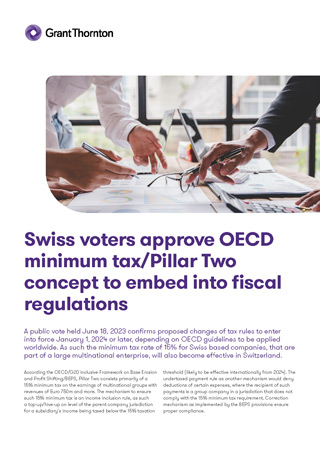-
Audit Industry, Services, Institutions
More security, more trust: Audit services for national and international business clients
-
Audit Financial Services
More security, more trust: Audit services for banks and other financial companies
-
Corporate Tax
National and international tax consulting and planning
-
Individual Tax
Individual Tax
-
Indirect Tax/VAT
Our services in the area of value-added tax
-
Transfer Pricing
Our transfer pricing services.
-
M&A Tax
Advice throughout the transaction and deal cycle
-
Tax Financial Services
Our tax services for financial service providers.
-
Advisory IT & Digitalisation
Generating security with IT.
-
Forensic Services
Nowadays, the investigation of criminal offences in companies increasingly involves digital data and entire IT systems.
-
Regulatory & Compliance Financial Services
Advisory services in financial market law and sustainable finance.
-
Mergers & Acquisitions / Transaction Services
Successfully handling transactions with good advice.
-
Legal Services
Experts in commercial law.
-
Trust Services
We are there for you.
-
Business Risk Services
Sustainable growth for your company.
-
IFRS Services
Die Rechnungslegung nach den International Financial Reporting Standards (IFRS) und die Finanzberichterstattung stehen ständig vor neuen Herausforderungen durch Gesetzgeber, Regulierungsbehörden und Gremien. Einige IFRS-Rechnungslegungsthemen sind so komplex, dass sie generell schwer zu handhaben sind.
-
Abacus
Grant Thornton Switzerland Liechtenstein has been an official sales partner of Abacus Business Software since 2020.
-
Accounting Services
We keep accounts for you.
-
Payroll Services
Leave your payroll accounting to us.
-
Real Estate Management
Leave the management of your real estate to us.
-
Apprentices
Career with an apprenticeship?!

According the OECD/G20 inclusive Framework on Base Erosion and Profit Shifting/BEPS, Pillar Two consists primarily of a 15% minimum tax on the earnings of multinational groups with revenues of Euro 750m and more. The mechanism to ensure such 15% minimum tax is an income inclusion rule, as such a top-up/hive-up on level of the parent company jurisdiction for a subsidiary’s income being taxed below the 15% taxation threshold (likely to be effective internationally from 2024). The undertaxed payment rule as another mechanism would deny deductions of certain expenses, where the recipient of such payments is a group company in a jurisdiction that does not comply with the 15% minimum tax requirement. Correction mechanism as implemented by the BEPS provisions ensure proper compliance.
Combined Swiss federal and cantonal/communal income tax rates have decreased lately and are currently typically in the range of 11%–13%. This holds true for most cantons attractive for international business, while some cantons continue to have higher than a combined 15% tax rate, such as the canton of Zurich, the canton with the highest economic power. The new domestic rule is applicable only for in-scope entities that are part of a group of companies with turnover of Euro 750m or higher. From matching estimates, around 500 Swiss TopCos and around 2’000 Swiss based subsidiaries are in-scope of the Euro 750m threshold. Consequently, Switzerland will implement a split of tax rates to apply a lower than 15% combined tax rate at the discretion of cantonal legislation for all corporate tax payers that are not part of a multinational group and to enforce a minimum tax rate of 15% for Swiss based companies that belong to a multinational group with revenues of Euro 750m or more. As an outcome, the vast majority of corporate tax payers in Switzerland will not be affected by such a minimum tax but may continue to be taxed at a reasonable say 11%–13% rate. Cantons that will be required to increase its tax revenue for in-scope tax payers may in general use the bulk of that additional tax revenue at its own discretion, with the limitation as set by the national fiscal equalization mechanism and under the reservation of not granting state-aid to minimum tax in-scope entities. Plans on the use of such excess tax revenue of expectingly CHF 1’000m to CHF 2’000m are dependent on cantonal preferences. In general, most cantons will use such additional fiscal revenue to strengthen the attractiveness of their canton for corporate entities and for lowering the tax burden for individuals.
Whilst the BEPS measures on minimum taxation stand in contrast to recent efforts in Switzerland to offer a corporate entity friendly tax environment, it offers planning opportunities. Companies with less than Euro 750m are generally not-in scope for the 15% minimum taxation and Switzerland has no explicit controlled foreign company/cfc rules and is highly economically competitive. Further, the quality of living in Switzerland is rated as one of the highest in the world. Overall, this shelters the unique positioning of Switzerland as an attractive business hub for functional, active international business.


